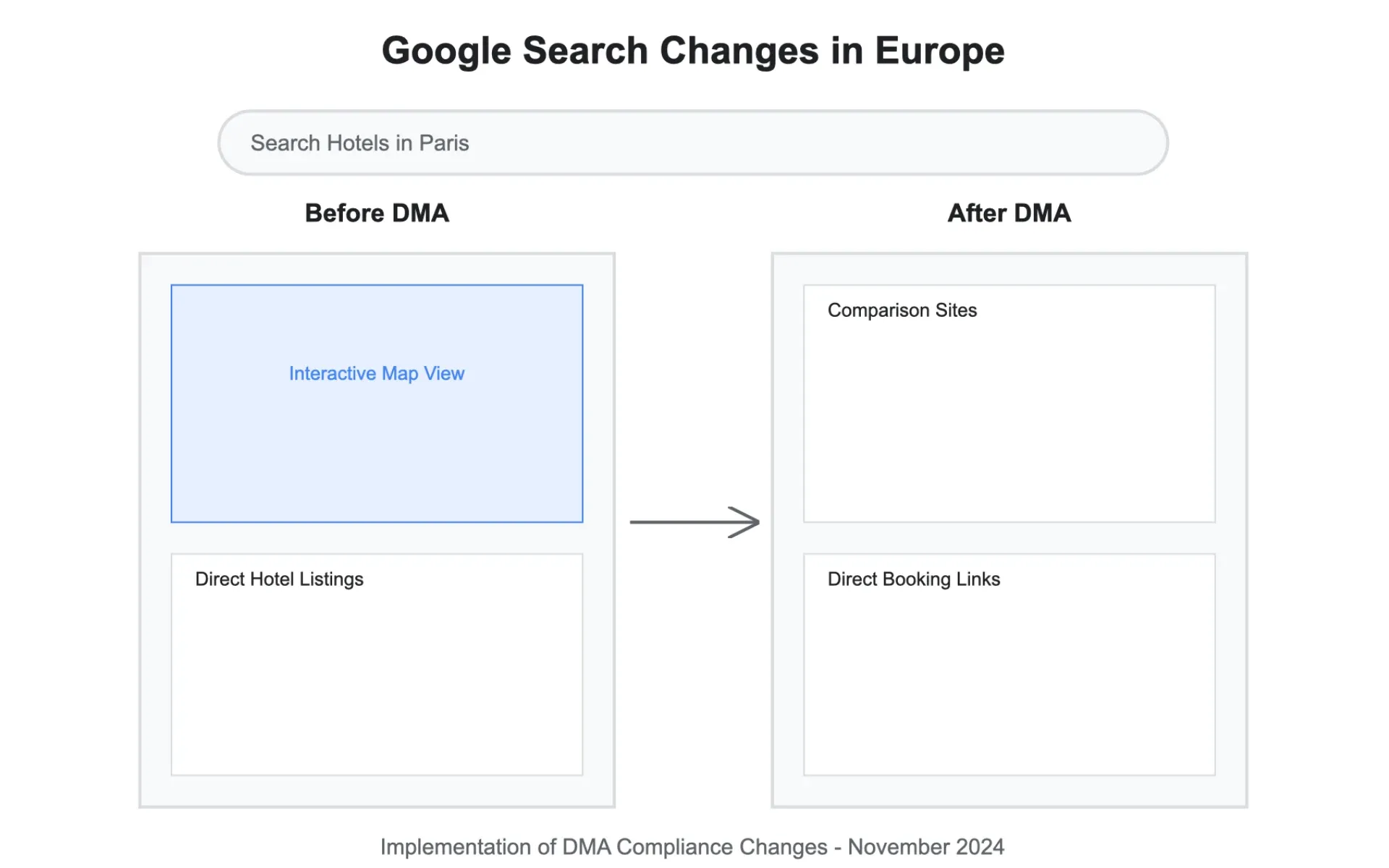Google announces major changes to Search Features in Europe under DMA compliance
Google details significant modifications to its search services in Europe, including new comparison tools and removal of features, to comply with DMA regulations.

Four days ago, on November 26, 2024, Google's Director of Legal, Oliver Bethell, announced substantial modifications to Google Search services in Europe to comply with the Digital Markets Act (DMA). The changes, implemented over the past year, affect how users interact with search results for products, hotels, and flights across European markets, with a particular impact on comparison sites and direct suppliers.
According to Google's official announcement, the company has introduced more than 20 modifications to its search engine functionality in Europe. These changes include new dedicated units that increase the visibility of comparison sites for categories such as flights, hotels, and shopping. The modifications represent a significant shift from Google's previous search result presentation methods, directly affecting both large aggregators and small businesses.
According to data shared by airlines, hotel operators, and small retailers, the initial round of changes has resulted in a significant decrease in direct booking traffic. These businesses report a reduction of up to 30% in free direct booking clicks since the implementation of the original modifications. This decline highlights the complex balance between promoting comparison sites and maintaining direct supplier visibility in search results.
The technical modifications to Google Search in Europe encompass several key changes to the platform's functionality. The new search interface implements equally formatted units that present users with two distinct types of results: comparison site listings and direct supplier website links. These units maintain consistent formatting across both result types, ensuring neither category receives preferential treatment in the visual hierarchy.
The modified search results now incorporate detailed price information directly in search results, along with visual elements such as product images and additional website preview information. New specialized advertising units designed specifically for comparison sites have also been implemented to enhance the visibility of these services.
According to the announcement, Google will conduct a limited test in three European countries: Germany, Belgium, and Estonia. During this test period, Google will remove specific hotel-related features, including the interactive map displaying hotel locations and hotel results typically shown below the map. Additional contextual features beyond basic website links will also be temporarily removed. This test will temporarily revert these markets to a simplified "ten blue links" format, reminiscent of Google's earlier search interface design.
The compliance process has involved extensive consultation with European authorities and industry stakeholders. According to Google's records, the company has hosted over 100 conferences and roundtables, engaged in continuous dialogue with the European Commission, collected feedback from various industry participants, and conducted multiple rounds of feature modifications to ensure alignment with regulatory requirements.
The Digital Markets Act represents one of the most significant regulatory changes affecting digital platforms in Europe. The legislation aims to ensure fair competition in digital markets, prevent large platforms from abusing market dominance, promote innovation and consumer choice, and protect smaller businesses operating in digital marketplaces.
The compliance measures have led to the removal or modification of several technical functionalities, including interactive flight information displays, certain map functionality, direct booking interfaces, and integrated comparison tools. These changes reflect the comprehensive nature of the DMA's requirements and their impact on platform functionality.
The implementation status as of November 2024 includes over 20 distinct modifications to search functionality, new comparison site promotion units, modified advertising systems, reduced functionality for specific features, and temporary removal of certain tools in test markets. These changes demonstrate the extensive scope of the compliance efforts and their impact on various aspects of the search experience.
The current data shows varying effects across different stakeholder groups. Large online travel aggregators and comparison sites have experienced increased visibility in search results, enhanced promotion opportunities, new dedicated advertising units, and greater prominence in specific search categories. Conversely, small businesses and direct suppliers have faced a 30% reduction in direct booking clicks, decreased visibility for direct sales channels, modified access to integrated tools, and altered competition dynamics with larger platforms.
The implementation of new comparison features requires development of standardized formatting systems, integration of price and image display capabilities, creation of new advertising unit specifications, modification of existing search result layouts, and implementation of testing protocols in selected markets. These technical requirements reflect the complexity of maintaining compliance while preserving functionality.
According to the announcement, upcoming changes will include additional modifications to search result presentation, new format testing in selected markets, continued stakeholder engagement, and regular assessment of impact on users and businesses. These plans indicate an ongoing commitment to achieving and maintaining compliance with DMA requirements.
The implementation process follows specific regulatory requirements, including adherence to DMA guidelines, regular consultation with European Commission, documentation of changes and their effects, and monitoring of competitive impact. This framework ensures a structured approach to achieving and maintaining compliance with the new regulations.
Key Facts
The announcement was made on November 26, 2024, detailing more than 20 search modifications. The changes have resulted in up to 30% reduction in direct booking clicks for some businesses. Testing is being conducted in Germany, Belgium, and Estonia, following over 100 conferences and roundtables with stakeholders. The implementation has occurred throughout the past year, affecting flights, hotels, and shopping categories. Technical changes include new units, formats, and advertising systems across European markets under the Digital Markets Act framework. The current status shows ongoing implementation and testing, with feature removals including flight information and certain map functionalities. New additions encompass comparison site units and enhanced information display, with short-term testing for specific features in consultation with European Commission and industry stakeholders.

